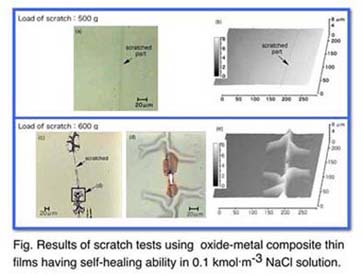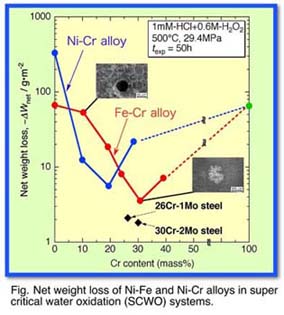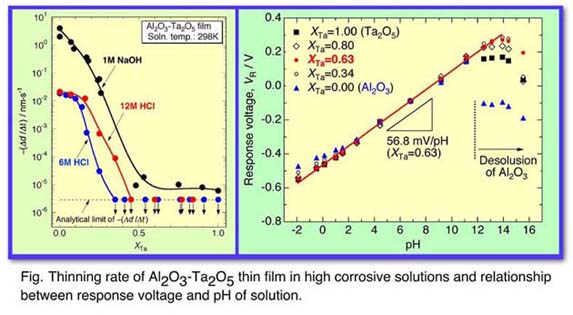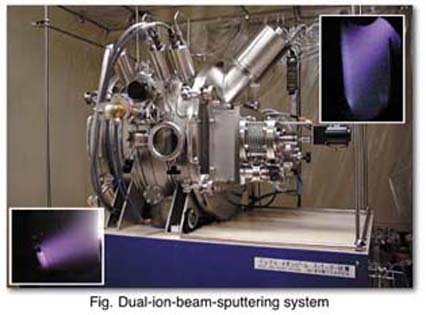
Materials Electrochemistry Laboratory
Professor, Nobuyoshi HaraResearch Assistant, Noboru Akao |
1. Formation of thin films having superior functions and performances and their application to thin film devices
(1) Formation of artificial passivation films by ion-beam-sputter deposition.
(2) Formation of oxide-metal composite thin films having self-healing ability.
(3) Formation of corrosion-resistant CrN thin films by ion-beam-enhanced deposition.
(4) In-situ ellipsometric analysis of growth processes of high-k oxide thin films deposited by ion-beam-sputtering.
2. Corrosion protection of materials used in energy- and environment-related devices and processes 
(1) Development of new coated steels for methanol storage tanks.
(2) Galvanic corrosion of Zr/Ta/SUS304 joints in reprocessing environments of spent nuclear fuel.
(3) Development of low-alloy steel overpack materials for underground disposal of high-level radioactive wastes.
(4) Corrosion mechanism of metals and alloys in supercritical water oxidation (SCWO) systems.
(5) Corrosion protection of pure Mg and Mg-base alloys.
3.Development of chemical and electrochemical sensors for measurement and control of corrosion environment 
(1) Fabrication of electrolyte-insulator semiconductor (EIS) pH sensors having a wide pH response range and high corrosion resistance.
(2) Development of oxygen sensors with a Ag.YSZ composite thin film electrode for decreasing operation temperature.
(3) Development of solid electrolyte pH sensors for use in supercritical water.
(4) Development of external pressure-balanced reference electrode for use in SCWO systems.
4.Basic and advanced technologies
(1) Corrosion behavior of pure W and W-base alloys used for spallation neutron targets.
(2) Corrosion mechanism of metals and alloys in downstream environments of CF4/O2 plasmas.
(3) Electrochemical evaluation of adhesion between photoresist and invar alloy for fine etching.
(4) Discoloration mechanism of titanium in atmospheric corrosion environments.
The laboratory is equipped with various instrumentations for thin film fabrication, surface characterization, electrochemical measurements, and corrosion tests. These include the following equipments:
(1) Dual-ion-beam-sputtering system (Lab. made)
(2) X-ray photoelectron spectrometer (Shimadzu ESCA-3400)
(3) Frequency response analyzer (Solartron model 1250 and 1260)
(4) Multichannel spectroscopic ellipsometer (Lab. made)
(5) Single wavelength ellipsometer (Lab. made)
(6) Atomic Force Microscope (Shimadzu SPM-9500)
(7) Surface Profiler (Tencor Alpha-Step 500)
(8) FT-IR spectrophotometer (Shimadzu FTIR-4200)
Return to the home page of our organigation.